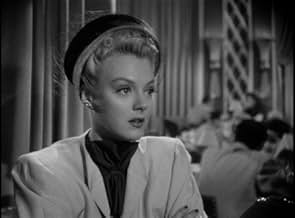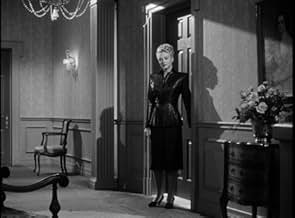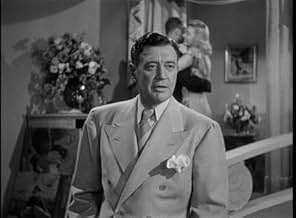A wealthy wife suspects her artist husband's affair with his model. He poisons his wife for inheritance but faces unexpected consequences after her death. A thriller exploring greed, betraya... Read allA wealthy wife suspects her artist husband's affair with his model. He poisons his wife for inheritance but faces unexpected consequences after her death. A thriller exploring greed, betrayal, and the consequences of criminal actions.A wealthy wife suspects her artist husband's affair with his model. He poisons his wife for inheritance but faces unexpected consequences after her death. A thriller exploring greed, betrayal, and the consequences of criminal actions.
- Director
- Writers
- Stars
- George
- (uncredited)
- Messenger Boy
- (uncredited)
- Artist
- (uncredited)
- Henry Loring
- (uncredited)
- Whistler
- (uncredited)
- Jorgensen
- (uncredited)
- McLaren aka Mac
- (uncredited)
- Butler
- (uncredited)
- Girl
- (uncredited)
- Detective Lieutenant
- (uncredited)
- Girl
- (uncredited)
- Director
- Writers
- All cast & crew
- Production, box office & more at IMDbPro
Featured reviews
*** (out of 4) T
he sixth film in Columbia's series and the last to feature Richard Dix. In the film Dix plays an artist who begins dating a younger woman (Leslie Brooks) while waiting for his wife to die. After the wife dies he marries the younger woman but soon she starts to fear that he might have killed the first wife. This is another good entry in the series that manages to build some nice suspense with its very entertaining story and another fine performance by Dix. Not only is Dix very good in his role but the supporting cast is great as well. Brooks turns in a very good performance as the woman who begins to suspect the worst. Michael Duane and Mary Currier co-star as a newspaper man and Dix's first wife. The story goes by at a very fast pace and there's some nice twists and turns along the way. The film focuses on a psychological horror aspect, which is where the suspense comes from.
Here he plays a less than admirable character. He is a painter. Amazingly, the painting of his that we first see is pretty decent. So often, even in the toniest of A-pictures, paintings by supposedly great artists looked like the work of quick-sketch artists or Sunday painters.
The film opens with a stylishly noirish woman buying her own tombstone. Everything bout this film has the marvelous dark look of a film noir. Or of an Edward Hopper paintings. The scenes look especially like book jackets from the time.
And the female lead looks right off the cover of some true-crime book. Wow, she looks both right and beautiful! And she -- Leslie Brooks -- is a fine actress too. (Intriguingly, she looks like the same studio's biggest star ten years hence: Kim Novak.)
The whole series is entertaining, even the final film, which does not have Dix in it.
One problem I encountered and others may as well: Clearly the movies were based on a radio program of their time. I have never heard that program, though. I get the idea that the Whistler is an omniscient criminologist who either has no bodily image or, like Lamont Cranston of "The Shadow," can make himself invisible.
Guess I will try to track some tapes of the series down. In the meantime, do yourself a favor and search out these films. They're all good. A couple, like this one, are very good.
When his wife dies, he does marry again--but has to play a cat-and-mouse game with his new wife when she begins to suspect him of murder.
Dix plays his role quite effectively and Leslie Brooks is stunning as the blonde beauty. She never had a better chance than she does here, but unfortunately Columbia was never able to find anything but supporting roles for her in B-films of the period.
Suspenseful, it takes awhile before the tense proceedings start to tighten up, but it's worth ending for the good finale. MICHAEL DUANE has a small supporting role as an artist but gets star billing.
Well directed by George Sherman, these series are better than average programmers.
Nonetheless, the story keeps us watching. As usual we can't be sure how events will turn out since Dix's character is as morally compromised as in the other entries. Unlike other Hollywood films of that era, there is no one to root for as the plot unfolds. Thus, it's the story itself that holds our interest, and not the more predictable question of how a hero will triumph. Fortunately, the ending comes up with the usual fine touch of irony that fans expect.
There's an expertly shaded performance by Mary Currier as Dix's star-crossed wife. Watch the subtlety of her expressions as she learns about her wayward husband. The series itself did not depend on subtle acting-- and certainly Dix doesn't manage the Lothario role very well. Nonetheless, Currier delivers an A-grade performance. (In passing-- I expected the screenplay to develop the scheming relationship between blonde model Kay and her effete boyfriend Jim more fully than it did. That could have set up an interesting dynamic of those schemers competing against another schemer, Dix.) Anyway, stylish or not, this remains a very watchable hour of frustrated passion and the hand of fate.
Again the Whistler just walks around as Narrator. He doesn't get involved in the plot.
The series stars Richard Dix. Here he plays Ralph Harrison, a not great artist who lives off his sick wife's (Mary Currier) money. In the beginning of the film, we see her ordering her own gravestone!
Edith Harrison has a terminal heart condition. When her husband meets model Kay Morrell (the very pretty Leslie Brooks), he falls in love with her. However, a new doctor has gotten Edith out of her sickbed and ready to live again.
Edith goes to her husband's studio to surprise him. She's the one surprised as she overhears him declaring his love for Kay and saying Edith will be gone soon. In fact, he decides to help her along.
Richard Dix is an actor I have a hard time with. I find his acting not good, along with his hairpiece, and he's quite rigid. Sometimes he's a good guy in the Whistler series; here he's a bad one. There's a twist at the end.
This is the best Whistler I've seen.
Did you know
- TriviaThis is the penultimate film of Richard Dix, being 99th out of the 100 he made.
- GoofsAfter Harrison's servant discovers Mrs Harrison lying on the floor, using the bedroom phone tells Loring she hangs up and then calls the doctor. But, the phone downstairs that she originally answered when Loring called is still off the hook and therefore she would not be able to make the call.
- Quotes
Ralph Harrison: What's the matter, Darling?
Edith Marie Harrison: Stop acting, Ralph. There's nothing quite so contemptible as a hypocrite.
- ConnectionsFollowed by The Thirteenth Hour (1947)
- SoundtracksPut The Blame On Mame
Written by Allan Roberts and Doris Fisher
Played during the party in Ralph's studio
- List: "The Whistler" radio episodes
Details
- Release date
- Country of origin
- Official sites
- Language
- Also known as
- Секрет Свистуна
- Production company
- See more company credits at IMDbPro
- Runtime1 hour 5 minutes
- Color
- Aspect ratio
- 1.37 : 1
Contribute to this page





















